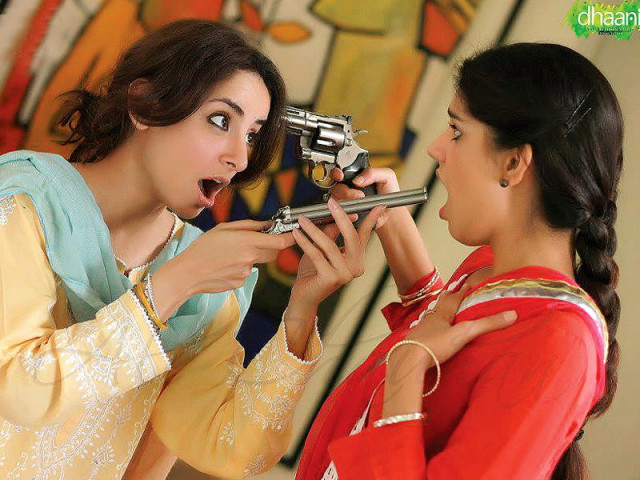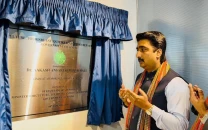Dhaani: Great performances lost in vain
Sarwat Gillani breathes life into otherwise hollow script.

Sarwat Gillani breathes life into otherwise hollow script.
What makes it worse is the theme which seems more preachy than inspiring; a husband is having an affair with a gori but it turns out it’s just the imagination of the wife and her neighbour. At the end, much to the audience’s surprise, there is no gori (referred to as the frock wali larki).
Written by Aamra Alam and Imrana Maqsood, the play revolves around the story of two housewives – Rashida played by Sarwat Gillani and Ruqqaya played by Sanam Saeed – who are friends as well as foes. The two neighbours, just like India and Pakistan, argue, celebrate and share their woes. Besides the typical jealous housewife antics, there is hardly anything in the story itself to keep the audience intrigued.
Dhaani, produced by Lollwood actor Shaan, is a well-performed play which tries hard to make a point but doesn’t quite succeed. Instead, it leaves the audience in fits of laughter.
Ruqqaya is relatively well-off, a trait reflected by her home’s luxurious interior, while Rashida has a less sophisticated life style. The latter, with her firangi mindset, ends up filling Ruqqaya’s head with baseless ideas that her husband is cheating on her with a “frock wali larki” and the whole narrative centres on that. Unfortunately, the play lacks a much-needed closure as there is no explanation about what really became of the frock wali larki.
Unlike the ups and downs present in any narrative, Dhaani maintains a flat line on its cardiogram throughout the play. This seems to be a general problem new playwrights face when they attempt to write original theatre plays. But it was a shock to see a seasoned writer like Maqsood, conform to the same mistake.

Despite the apparent flaws in the storyline, it was Sanam and Sarwat (primarily) who made Dhaani worth the watch. Sanam’s unimpressive performance in Zindagi Gulzar Hai suggested that being expressive wasn’t her forte but her performance in Dhaani has proved her acting prowess; it was a huge leap forward for her and speaks bundles of the untapped expression range and versatility she possesses.
Although Sanam’s performance was strong, it was Sarwat who stole the show. Sanam was forgettable when she stood next to Sarwat, a dynamic, marvelous and full-of-life actor. Sanam’s acting fell flat at times, next to the bubbly character of Sarwat whose stage presence, dialogue delivery and movement justified her character’s jealous personality perfectly.
Rashida’s mother (played by Sundus Tariq) and Fayyaz chacha (played by Kamal Hussain) added bits of humour also but ended up being a little irritating. The classical dance moves attempted by Sanam and Sarwat came off as a little half-hearted and didn’t really add anything to the play but more time.
Dhaani’s director Umar Sultan also needs to be given credit for bringing on stage the picture-perfect chemistry between the two lead actors which single-handedly drove the entire play as well as for pulling it off despite issues in the storyline.
A word of advice: Writers and directors should know that despite their anger at post-colonial stereotypes, revisiting those themes reaffirms that we haven’t quite moved on. Sanam and Sarwat try to pull it off with subtlety – the disagreements and fights between Pakistan and India by the arguments their characters have – the director still underestimates the maturity of the audience and felt the need to directly force the message in through a voice-over at the end. “300 saal pehley bhi yehi frock wali maim ayi thi”.
Verdict: Watch it for Sarwat’s stellar performance but don’t go if you’re looking for an engaging story. Despite lack of substance, hook or adequate ending, the script has powerful and humourous one-liners.
Dhaani will be on at the Arts Council till May 30 and the ticket is priced at Rs1,000.
Published in The Express Tribune, May 21st, 2013.
Like Life & Style on Facebook for the latest in fashion, gossip and entertainment.



















COMMENTS
Comments are moderated and generally will be posted if they are on-topic and not abusive.
For more information, please see our Comments FAQ